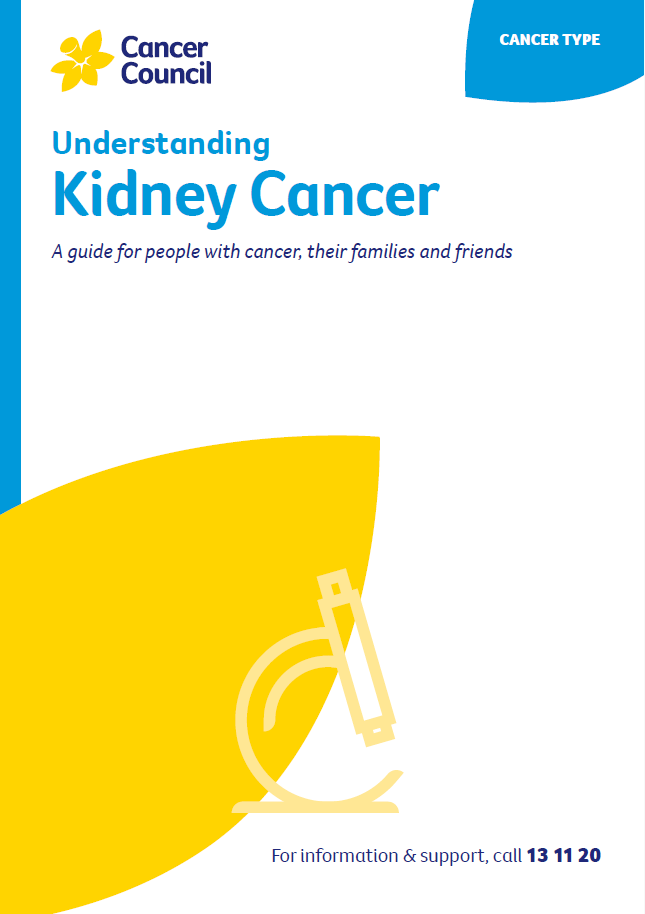- Home
- Kidney cancer
- Diagnosis
- Staging and prognosis
Staging and prognosis for kidney cancer
Once you have had tests that show you have kidney cancer, your doctor will work out the stage and grade of the cancer.
The stage describes how far the cancer has spread, while the grade describes how active the cancer cells are and how fast the cancer is likely to be growing. Staging and grading help the doctor decide on the best treatment for you.
Learn more about:
Grading kidney cancer
By examining a sample of kidney tissue, doctors can see how similar the cancer cells look to normal cells and estimate how fast the cancer is likely to grow. This is called grading.
Grading helps the doctors decide what follow-up treatment you might need and whether to consider a clinical trial.
In Australia, both the Fuhrman system and the newer International Society of Urological Pathology (ISUP) system may be used to grade kidney cancer.
Both systems grade kidney cancer from 1 to 4, with grade 1 the lowest and grade 4 the highest. As the grade increases, the cancer cells look less similar to normal cells. Higher-grade cancers tend to be more aggressive than lower-grade cancers.
Staging kidney cancer
The stage of a cancer describes how large it is, where it is, and whether it has spread beyond the kidney. Knowing the stage of the kidney cancer helps doctors plan the best treatment for you.
The stage can be given before surgery (clinical staging), but may be revised after surgery (pathologic staging).
If you have kidney cancer, your doctor will use the results of these tests to assign a stage of 1 to 4:
- stages 1–2 are considered early kidney cancer
- stages 3–4 are considered advanced kidney cancer.
How kidney cancer is staged
The most common staging system for kidney cancer is the TNM system, which stands for tumour–nodes–metastasis. This system gives numbers to the size of the tumour (T1–4), whether or not lymph nodes are affected (N0 or N1), and whether the cancer has spread or metastasised (M0 or M1). Based on the TNM numbers, the doctor then works out the cancer’s overall stage (1–4).
| stage 1 | The cancer is found in the kidney only and measures less than 7 cm. | early |
| stage 2 | The cancer is larger than 7 cm, but has not spread outside the kidney. | early |
| stage 3 | The cancer is any size and has spread to the major kidney veins, into the fat around the kidney, or to nearby lymph nodes. | locally advanced |
| stage 4 | The cancer has spread to surrounding tissue outside the kidney, to the adrenal gland or to more distant parts of the body (such as the distant lymph nodes, the liver, lungs, bone or brain). | advanced (metastatic) |
Prognosis
Prognosis means the expected outcome of a disease. You may wish to discuss your prognosis with your doctor, but it is not possible for anyone to predict the exact course of the disease. Your doctor can give you an idea about common issues that affect people with kidney cancer.
The stage of the cancer is the main factor in working out prognosis. In most cases, the earlier that kidney cancer is diagnosed, the better the chance of successful treatment. If the cancer has spread to other parts of the body, it is very unlikely that all of the cancer can be removed, but treatment can often keep it under control for some time.
People who can have surgery to remove kidney cancer tend to have better outcomes. Other factors such as your age, general fitness and medical history also affect prognosis.
→ READ MORE: Your health care team for kidney cancer
Podcast: Tests and Cancer
Listen to more episodes of our podcast for people affected by cancer
More resources
Dr Alarick Picardo, Urologist, Fiona Stanley Hospital, WA (clinical review); Heidi Castleden, Consumer; Donna Clifford, Urology Nurse Practitioner, Royal Adelaide Hospital, SA; Prof Paul De Souza, Medical Oncologist and Professor of Medicine, Nepean Cancer Care Centre, The University of Sydney, NSW; Mike Kingsley, Consumer; Prof Declan Murphy, Urologist and Director of Genitourinary Oncology, Peter MacCallum Cancer Centre, VIC; Caitriona Nienaber, 13 11 20 Consultant, Cancer Council WA; Luke O’Connor, Urology Nurse, Royal Brisbane and Women’s Hospital, QLD; A/Prof Shankar Siva, Radiation Oncologist and Cancer Council Victoria Colebatch Fellow, Peter MacCallum Cancer Centre, VIC; A/Prof Homi Zargar, Uro-Oncologist and Robotic Surgeon, Western Health and Royal Melbourne Hospital, VIC.
View the Cancer Council NSW editorial policy.
View all publications or call 13 11 20 for free printed copies.

